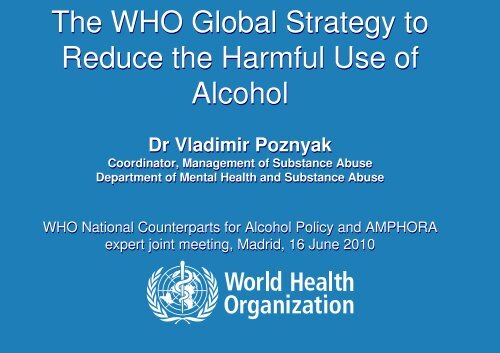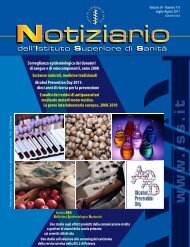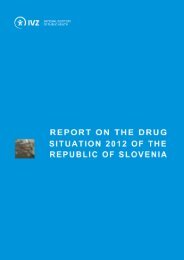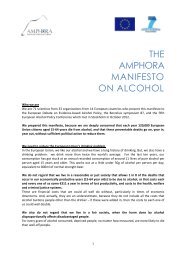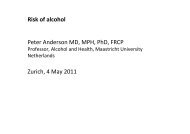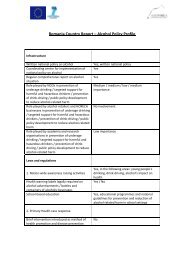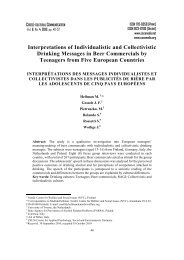The WHO Global Strategy to Reduce the Harmful Use of Alcohol The ...
The WHO Global Strategy to Reduce the Harmful Use of Alcohol The ...
The WHO Global Strategy to Reduce the Harmful Use of Alcohol The ...
- No tags were found...
Create successful ePaper yourself
Turn your PDF publications into a flip-book with our unique Google optimized e-Paper software.
WHA63.13 resolution "<strong>Global</strong> strategy <strong>to</strong>reduce <strong>the</strong> harmful use <strong>of</strong> alcohol"1. ENDORSES <strong>the</strong> global strategy <strong>to</strong> reduce <strong>the</strong>harmful use <strong>of</strong> alcohol;2. AFFIRMS that <strong>the</strong> global strategy <strong>to</strong> reduce<strong>the</strong> harmful use <strong>of</strong> alcohol aims <strong>to</strong> giveguidance for action at all levels and <strong>to</strong> setpriority areas for global action, and that it is aportfolio <strong>of</strong> policy options and measures…<strong>WHO</strong> National Counterparts for <strong>Alcohol</strong> Policy and AMPHORAExpert joint meeting, Madrid, 16 June 2010
World Health Assembly resolutions and <strong>WHO</strong> ECReports addressing alcohol-related problemsDevelopment <strong>of</strong><strong>WHO</strong> Programmeon <strong>Alcohol</strong>relatedprogrammes1979Prevention and control<strong>of</strong> drug and alcoholabuseWHA61.4resolution"Strategies <strong>to</strong>reduce <strong>the</strong> harmfuluse <strong>of</strong> alcohol"Report <strong>to</strong> WHA691989 2008 20131980 19832005 20072010First Report <strong>of</strong><strong>the</strong> <strong>WHO</strong> ExpertCommittee onProblems Related<strong>to</strong> <strong>Alcohol</strong>Consumption<strong>Alcohol</strong>consumption andrelated problemsPublic health problemscaused by harmful use <strong>of</strong>alcoholSecond Report <strong>of</strong><strong>the</strong> <strong>WHO</strong> ExpertCommittee onProblems Related<strong>to</strong> <strong>Alcohol</strong>Consumption<strong>Global</strong>strategy <strong>to</strong>reduce <strong>the</strong>harmful use<strong>of</strong> alcohol<strong>WHO</strong> National Counterparts for <strong>Alcohol</strong> Policy and AMPHORAExpert joint meeting, Madrid, 16 June 2010
WHA resolutions preceding development <strong>of</strong> <strong>WHO</strong>global strategy <strong>to</strong> reduce <strong>the</strong> harmful use <strong>of</strong> alcohol 2004: Health promotion and healthy lifestyles(WHA57.16)– Requested a report on <strong>the</strong> Organization’s future work on alcoholconsumption 2005 (58 th WHA): Public health problems caused byharmful use <strong>of</strong> alcohol (WHA58.26)– Requested:• <strong>to</strong> report <strong>to</strong> <strong>the</strong> Sixtieth World Health Assembly on evidencebasedstrategies and interventions <strong>to</strong> reduce alcohol-relatedharm…;• <strong>to</strong> draw up recommendations for effective policies andinterventions <strong>to</strong> reduce alcohol-related harm… .<strong>WHO</strong> National Counterparts for <strong>Alcohol</strong> Policy and AMPHORAExpert joint meeting, Madrid, 16 June 2010
60 th WHA: no consensus among MS on a globalstrategy <strong>to</strong> reduce harmful use <strong>of</strong> alcohol April 2007: Report by <strong>the</strong> Secretariat "Evidence-based andinterventions <strong>to</strong> reduced alcohol-related harm" with addendum"<strong>Global</strong> assessment <strong>of</strong> public health problems caused by harmfuluse <strong>of</strong> alcohol" submitted <strong>to</strong> <strong>the</strong> 60 th WHA through <strong>the</strong> EB. May 2007: 60 th WHA considered <strong>the</strong> report <strong>of</strong> <strong>the</strong> Secretariat and <strong>the</strong>drafts <strong>of</strong> a resolution proposed by Member States. Without aconsensus on <strong>the</strong> texts it was decided that an item entitled“Strategies <strong>to</strong> reduce <strong>the</strong> harmful use <strong>of</strong> alcohol” and relateddocuments discussed at <strong>the</strong> Health Assembly should be included in<strong>the</strong> agenda <strong>of</strong> <strong>the</strong> Executive Board at its 122nd session <strong>to</strong> be held inJanuary 2008, and requested <strong>the</strong> Direc<strong>to</strong>r-General, in <strong>the</strong> interim, <strong>to</strong>continue her work on this matter. May 2007: 121 st Executive Board considered and noted <strong>the</strong> SecondReport <strong>of</strong> <strong>the</strong> <strong>WHO</strong> Expert Committee on Problems Related <strong>to</strong><strong>Alcohol</strong> Consumption<strong>WHO</strong> National Counterparts for <strong>Alcohol</strong> Policy and AMPHORAExpert joint meeting, Madrid, 16 June 2010
Process for implementing <strong>the</strong> WHA 61.4resolution and preparing a draft global strategyStage I. Broad consultation process (Oc<strong>to</strong>ber – December 2008)Web-based consultation (<strong>WHO</strong> public hearings) with MemberStates and o<strong>the</strong>r stakeholders on ways <strong>of</strong> reducing harmful use <strong>of</strong>alcohol (3 Oc<strong>to</strong>ber 2008 till 15 November 2008)Round table meeting with economic opera<strong>to</strong>rs on ways <strong>the</strong>y couldcontribute <strong>to</strong> reducing harmful use <strong>of</strong> alcohol (6 November 2008)Round table meeting with NGOs and health pr<strong>of</strong>essionals on ways<strong>the</strong>y could contribute <strong>to</strong> reducing harmful use <strong>of</strong> alcohol (24-25November 2008)Consultation with intergovernmental organizations (8 September2009)<strong>WHO</strong> National Counterparts for <strong>Alcohol</strong> Policy and AMPHORAExpert joint meeting, Madrid, 16 June 2010
Stage II. Draft strategy developmentDiscussion paper "Towards a global strategy <strong>to</strong> reduce <strong>the</strong> harmfuluse <strong>of</strong> alcohol" (December 2008) Regional technical consultations with Member States (February –April 2009) in 6 <strong>WHO</strong> regionsWorking document for developing a draft global strategy <strong>to</strong> reduceharmful use <strong>of</strong> alcohol (August 2009, in 6 languages) Feedback on <strong>the</strong> working document from MS (September 2009)and informal consultation with Member States (8 Oc<strong>to</strong>ber 2009) Development <strong>of</strong> a draft global strategy (Oc<strong>to</strong>ber-November 2009)and its submission <strong>to</strong> <strong>the</strong> Sixty-third World Health Assemblythrough <strong>the</strong> EB (December 2009, in 6 languages)<strong>WHO</strong> National Counterparts for <strong>Alcohol</strong> Policy and AMPHORAExpert joint meeting, Madrid, 16 June 2010
126 th Executive Board MeetingDiscussions on <strong>the</strong> draft global strategy werepursued in an open-ended informal working group(co-chaired by Cuba and Sweden) during <strong>the</strong>Board session, and consensus was reached on arevised text. <strong>The</strong> Board adopted resolutionEB126.R11 where it recommends <strong>the</strong> WorldHealth Assembly <strong>to</strong> endorse <strong>the</strong> draft globalstrategy.<strong>WHO</strong> National Counterparts for <strong>Alcohol</strong> Policy and AMPHORAExpert joint meeting, Madrid, 16 June 2010
<strong>Global</strong> strategy <strong>to</strong> reduce <strong>the</strong> harmful use <strong>of</strong>alcohol: content Setting <strong>the</strong> scene Challenges and opportunities Aims and objectives Guiding principles National policies and measures Policy options and interventions <strong>Global</strong> action: key roles and components Implementing <strong>the</strong> strategy<strong>WHO</strong> National Counterparts for <strong>Alcohol</strong> Policy and AMPHORAExpert joint meeting, Madrid, 16 June 2010
<strong>Global</strong> strategy: vision and aims Vision: improved health and social outcomes forindividuals, families and communities, with considerablyreduced morbidity and mortality due <strong>to</strong> harmful use <strong>of</strong>alcohol and <strong>the</strong>ir ensuing social consequences. <strong>The</strong> global strategy aims <strong>to</strong> give guidance for action at alllevels; <strong>to</strong> set priority areas for global action; and <strong>to</strong>recommend a portfolio <strong>of</strong> policy options and measures thatcould be considered for implementation and adjusted asappropriate at <strong>the</strong> national level, taking in<strong>to</strong> accountnational circumstances, such as religious and culturalcontexts, national public health priorities, as well asresources, capacities and capabilities.<strong>WHO</strong> National Counterparts for <strong>Alcohol</strong> Policy and AMPHORAExpert joint meeting, Madrid, 16 June 2010
<strong>Global</strong> strategy: objectives(a) raised global awareness <strong>of</strong> <strong>the</strong> magnitude and nature <strong>of</strong> <strong>the</strong> health, social andeconomic problems caused by harmful use <strong>of</strong> alcohol, and increased commitmentby governments <strong>to</strong> act <strong>to</strong> address <strong>the</strong> harmful use <strong>of</strong> alcohol;(b) streng<strong>the</strong>ned knowledge base on <strong>the</strong> magnitude and determinants <strong>of</strong> alcoholrelatedharm and on effective interventions <strong>to</strong> reduce and prevent such harm;(c) increased technical support <strong>to</strong>, and enhanced capacity <strong>of</strong>, Member States forpreventing <strong>the</strong> harmful use <strong>of</strong> alcohol and managing alcohol-use disorders andassociated health conditions;(d) streng<strong>the</strong>ned partnerships and better coordination among stakeholders andincreased mobilization <strong>of</strong> resources required for appropriate and concerted action<strong>to</strong> prevent <strong>the</strong> harmful use <strong>of</strong> alcohol;(e) improved systems for moni<strong>to</strong>ring and surveillance at different levels, and moreeffective dissemination and application <strong>of</strong> information for advocacy, policydevelopment and evaluation purposes.<strong>WHO</strong> National Counterparts for <strong>Alcohol</strong> Policy and AMPHORAExpert joint meeting, Madrid, 16 June 2010
Guiding principles (1)(a)Public policies and interventions <strong>to</strong> prevent and reduce alcoholrelatedharm should be guided and formulated by public healthinterests and based on clear public health goals and <strong>the</strong> bestavailable evidence.(b)Policies should be equitable and sensitive <strong>to</strong> national, religious andcultural contexts.(c)All involved parties have <strong>the</strong> responsibility <strong>to</strong> act in ways that do notundermine <strong>the</strong> implementation <strong>of</strong> public policies and interventions <strong>to</strong>prevent and reduce harmful use <strong>of</strong> alcohol.(d)Public health should be given proper deference in relation <strong>to</strong>competing interests and approaches that support that directionshould be promoted.<strong>WHO</strong> National Counterparts for <strong>Alcohol</strong> Policy and AMPHORAExpert joint meeting, Madrid, 16 June 2010
Guiding principles (2)(e)Protection <strong>of</strong> populations at high risk <strong>of</strong> alcohol-attributable harm andthose exposed <strong>to</strong> <strong>the</strong> effects <strong>of</strong> harmful drinking by o<strong>the</strong>rs should bean integral part <strong>of</strong> policies addressing <strong>the</strong> harmful use <strong>of</strong> alcohol.(f) Individuals and families affected by <strong>the</strong> harmful use <strong>of</strong> alcohol shouldhave access <strong>to</strong> affordable and effective prevention and careservices.(g)Children, teenagers and adults who choose not <strong>to</strong> drink alcoholbeverages have <strong>the</strong> right <strong>to</strong> be supported in <strong>the</strong>ir non-drinkingbehaviour and protected from pressures <strong>to</strong> drink.(h)Public policies and interventions <strong>to</strong> prevent and reduce alcoholrelated harm should encompass all alcoholic beverages andsurrogate alcohol.<strong>WHO</strong> National Counterparts for <strong>Alcohol</strong> Policy and AMPHORAExpert joint meeting, Madrid, 16 June 2010
<strong>Global</strong> action: key components Public health advocacy and partnership Technical support and capacity building Production and dissemination <strong>of</strong>knowledge Resource mobilization<strong>WHO</strong> National Counterparts for <strong>Alcohol</strong> Policy and AMPHORAExpert joint meeting, Madrid, 16 June 2010
Recommended target areas for policymeasures and interventions1. Leadership, awareness and commitment2. Health services' response3. Community action4. Drink-driving policies and countermeasures5. Availability <strong>of</strong> alcohol6. Marketing <strong>of</strong> alcoholic beverages7. Pricing policies8. Reducing <strong>the</strong> negative consequences <strong>of</strong> drinking and alcohol in<strong>to</strong>xication9. Reducing <strong>the</strong> public health impact <strong>of</strong> illicit alcohol and informally producedalcohol10. Moni<strong>to</strong>ring and surveillance<strong>WHO</strong> National Counterparts for <strong>Alcohol</strong> Policy and AMPHORAExpert joint meeting, Madrid, 16 June 2010
Implementing <strong>the</strong> strategy Concerted action by Member States Effective global governance Appropriate engagement <strong>of</strong> all relevantstakeholders<strong>WHO</strong> National Counterparts for <strong>Alcohol</strong> Policy and AMPHORAExpert joint meeting, Madrid, 16 June 2010
Links and interfaces with o<strong>the</strong>r strategies, plansand programmesFramework for alcohol policy in <strong>the</strong> <strong>WHO</strong> European Region and o<strong>the</strong>r regionalalcohol policy frameworks<strong>Global</strong> strategy for <strong>the</strong> prevention and control <strong>of</strong> noncommunicable diseases<strong>Global</strong> strategy on diet, physical activity and healthTobacco controlHealth promotion and healthy lifestyleCancer prevention and controlMental Health Gap Action Programme…<strong>WHO</strong> National Counterparts for <strong>Alcohol</strong> Policy and AMPHORAExpert joint meeting, Madrid, 16 June 2010
Moni<strong>to</strong>ring progress and reportingmechanismsAppropriate mechanisms at different levels for assessment,reporting and re-programmingImpact-focused perspective<strong>Global</strong> Information System on <strong>Alcohol</strong> and Health (GISAH) and<strong>WHO</strong>’s <strong>Global</strong> Survey on <strong>Alcohol</strong> and Health as important partsRegular meetings <strong>of</strong> global and regional networks <strong>of</strong> nationalcounterpartsRegular reports <strong>to</strong> <strong>WHO</strong> regional committees and <strong>the</strong> HealthAssembly. Information about implementation and progress shouldalso be presented at regional or international forums andappropriate intergovernmental meetings.<strong>WHO</strong> National Counterparts for <strong>Alcohol</strong> Policy and AMPHORAExpert joint meeting, Madrid, 16 June 2010
WHA63.13 URGES Member States*:(1) <strong>to</strong> adopt and implement <strong>the</strong> global strategy <strong>to</strong> reduce <strong>the</strong>harmful use <strong>of</strong> alcohol as appropriate in order <strong>to</strong>complement and support public health policies in MemberStates <strong>to</strong> reduce <strong>the</strong> harmful use <strong>of</strong> alcohol, and <strong>to</strong> mobilizepolitical will and financial resources for that purpose;(2) <strong>to</strong> continue implementation <strong>of</strong> <strong>the</strong> resolutions WHA61.4 on<strong>the</strong> strategies <strong>to</strong> reduce <strong>the</strong> harmful use <strong>of</strong> alcohol andWHA58.26 on public-health problems caused by harmfuluse <strong>of</strong> alcohol;---------------------------------------------------------------------------------* And regional economic integration organizations, where applicable.<strong>WHO</strong> National Counterparts for <strong>Alcohol</strong> Policy and AMPHORAExpert joint meeting, Madrid, 16 June 2010
WHA63.13 URGES Member States(continued):(3) <strong>to</strong> ensure that implementation <strong>of</strong> <strong>the</strong> global strategy <strong>to</strong>reduce <strong>the</strong> harmful use <strong>of</strong> alcohol streng<strong>the</strong>ns <strong>the</strong> nationalefforts <strong>to</strong> protect at-risk populations, young people and thoseaffected by harmful drinking <strong>of</strong> o<strong>the</strong>rs;(4) <strong>to</strong> ensure that implementation <strong>of</strong> <strong>the</strong> global strategy <strong>to</strong>reduce <strong>the</strong> harmful use <strong>of</strong> alcohol is reflected in <strong>the</strong> nationalmoni<strong>to</strong>ring systems and reported regularly <strong>to</strong> <strong>WHO</strong>’sinformation system on alcohol and health;<strong>WHO</strong> National Counterparts for <strong>Alcohol</strong> Policy and AMPHORAExpert joint meeting, Madrid, 16 June 2010
WHA63.13 REQUESTS <strong>the</strong> Direc<strong>to</strong>r-General:(1) <strong>to</strong> give sufficiently high organizational priority, and<strong>to</strong> assure adequate financial and humanresources at all levels, <strong>to</strong> <strong>the</strong> prevention andreduction <strong>of</strong> harmful use <strong>of</strong> alcohol andimplementation <strong>of</strong> <strong>the</strong> global strategy <strong>to</strong> reduce <strong>the</strong>harmful use <strong>of</strong> alcohol;<strong>WHO</strong> National Counterparts for <strong>Alcohol</strong> Policy and AMPHORAExpert joint meeting, Madrid, 16 June 2010
WHA63.13 REQUESTS <strong>the</strong> Direc<strong>to</strong>r-General(continued):(2) <strong>to</strong> collaborate with and provide support <strong>to</strong> MemberStates, as appropriate, in implementing <strong>the</strong> globalstrategy <strong>to</strong> reduce <strong>the</strong> harmful use <strong>of</strong> alcohol andstreng<strong>the</strong>ning national responses <strong>to</strong> public healthproblems caused by <strong>the</strong> harmful use <strong>of</strong> alcohol;(3) <strong>to</strong> moni<strong>to</strong>r progress in implementing <strong>the</strong> globalstrategy <strong>to</strong> reduce <strong>the</strong> harmful use <strong>of</strong> alcohol and<strong>to</strong> report progress, through <strong>the</strong> Executive Board, <strong>to</strong><strong>the</strong> Sixty-sixth World Health Assembly.<strong>WHO</strong> National Counterparts for <strong>Alcohol</strong> Policy and AMPHORAExpert joint meeting, Madrid, 16 June 2010
Do we have a quick and universal way <strong>of</strong>reducing <strong>the</strong> harmful use <strong>of</strong> alcohol globally?"For every complex problem, <strong>the</strong>re isa solution that is simple, neat…"<strong>WHO</strong> National Counterparts for <strong>Alcohol</strong> Policy and AMPHORAExpert joint meeting, Madrid, 16 June 2010
Do we have a quick and universal way <strong>of</strong>reducing <strong>the</strong> harmful use <strong>of</strong> alcohol globally?"For every complex problem, <strong>the</strong>re isa solution that is simple, neat andwrong."(H.L. Menchen)<strong>WHO</strong> National Counterparts for <strong>Alcohol</strong> Policy and AMPHORAExpert joint meeting, Madrid, 16 June 2010
Will <strong>the</strong> strategy solve <strong>the</strong> global problem <strong>of</strong><strong>the</strong> harmful use <strong>of</strong> alcohol?"All <strong>the</strong> greatest and most importantproblems <strong>of</strong> life are fundamentallyinsolvable. <strong>The</strong>y can never be solved,but only outgrown."Carl Jung<strong>WHO</strong> National Counterparts for <strong>Alcohol</strong> Policy and AMPHORAExpert joint meeting, Madrid, 16 June 2010
<strong>WHO</strong> Department <strong>of</strong> Mental Health and Substance AbuseManagement <strong>of</strong> Substance AbuseThank you!http://www.who.int/substance_abuse/<strong>WHO</strong> National Counterparts for <strong>Alcohol</strong> Policy and AMPHORAExpert joint meeting, Madrid, 16 June 2010


